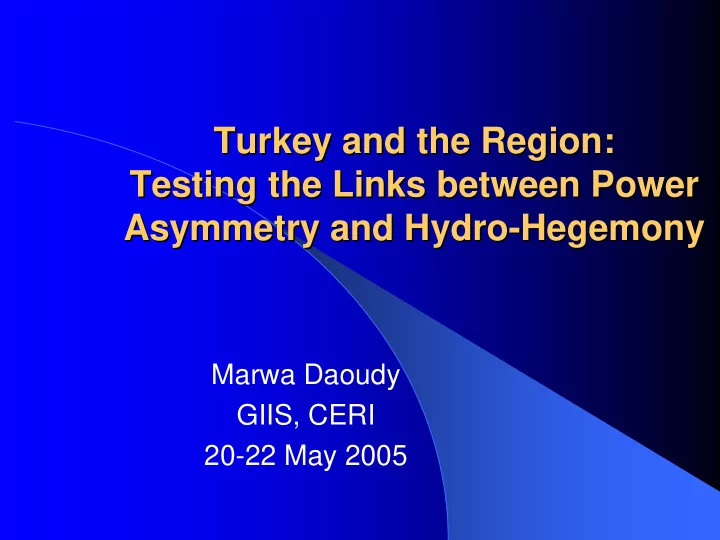

Turkey and and the the Region Region: : Turkey Testing the the Links Links between between Power Power Testing Asymmetry and and Hydro Hydro- -Hegemony Hegemony Asymmetry Marwa Daoudy GIIS, CERI 20-22 May 2005
Hydro- -Hegemony Hegemony Theory Theory Hydro � Critical Security Studies (Non Traditional Security Studies) : new threats to national security (Krause & Williams, 1997) and securitization of environmental issues (Deudney, 1990, Buzan, 1991; Korany, Brynen & Noble, 1993, Buzan, Waever & De Wilde, 1998) � Hegemonic Stability Theory (neo-realist approach, Kindleberger, 1973): power of the hegemon � Most powerful riparian imposes water policies � No conflict if not in hegemon’s interest (Lowi, 1993; Waterbury, 1994). Euphrates & Tigris Basins: Power Asymmetry & Hydro-Hegemony
Hegemonic Stability Theory Hegemonic Stability Theory • Regimes are most effective when a hegemon emerges • Hegemon can enforce rules & norms unilaterally, avoiding collective goods problem Euphrates & Tigris Basins: Power Asymmetry & Hydro-Hegemony
Definition of the “Hegemon Hegemon” ” Definition of the “ • State that temporarily gains a preponderance of power in the international and/or regional system • It can unilaterally dominate the rules and procedures that guide political and economic relations Euphrates & Tigris Basins: Power Asymmetry & Hydro-Hegemony
Hegemonic Stability Theory Hegemonic Stability Theory • Prediction: strong hegemonic powers increase international stability and peace • E.g: Britain in 19th c. (regime for the oceans), US after WW2 initiated and maintained global economic and security framework Euphrates & Tigris Basins: Power Asymmetry & Hydro-Hegemony
Some Questions About Hegemonic Some Questions About Hegemonic Stability Theory Stability Theory • Other states try to influence rules through their participation to int. institutions • What if the hegemon’s interests do not coincide with other countries’ interests? • Issues of infringement on State sovereignty Euphrates & Tigris Basins: Power Asymmetry & Hydro-Hegemony
Power: : Power A Central Influencing Influencing Variable Variable A Central � Defining power: Dahl, 1957 � Debating about Power: « Is power a property or a relationship? Is it potential or actual, a capacity or the exercice of a capacity? By whom or what, is it possessed or exercised (….). Over whom or upon what is it exercised? What kinds of outcomes does it produce: does it modify interests, options, preferences, policies or behaviour? Is it a zero-sum concept? » (Lukes, 1991) � Time as a source of power (Rubinstein, 1982 & 1985)
Two Faces Faces of of Power Power Two � STRUCTURAL POWER: possession & mobilization of capabilities (eco, pol., upstream/downstream position, size of territory, population…) – neo-realists � The ability to set the agenda & the rules of the games � The ability to control results (Bachrach & Baratz, 1962, 1970) � The ability to mobilize resources, create options and constrain actions (Guzzini, 1993) � BARGAINING POWER : power as a relation � Impact on one’s and other’s options and alternatives: weaker not so weak � Cost of no-agreement and value of time
Negotiation & & Power Power Asymmetries Asymmetries Negotiation . STRUCTURE . Power Asymmetry: NEGOTIATION Resources Geography Costs of no Agreement RESULTS STRATEGIES PROCESSES - Tension Cooperation/Conflict PREDOMINANTLY AGREEMENTS STRATEGIES DISTRIBUTIVE: AGREEMENTS * 1960-1993: Turkey, Sy, Iraq More Issues, Actors * 2002: Turkey, Syria New Sources of Power . Land/Water 1987, 1990 . POSITIONS . Coalitions (Syria, . International Water Law COLLATERAL Iraq vs. Israel/Turkey) 1998 (T/S - Kurds ) Time Influence Tension between cooperation and conflict Negotiating the Euphrates and Tigris Waters: Securitisation in Asymmetry of Power (Daoudy, 2005)
NEGOTIATION NEGOTIATION � Sequential process: bilateral (1960-1980; 2001-2002) & trilateral (1980-1993): � Turkey: absolute sovereignty � Syria: equitable utilization � Iraq: prior use, historic rights � Bilateral Agreements: � Syria/Turkey (1987): min. 500 m3/s. � Syria/Iraq (1989): 58 % - 42 % Euphrates & Tigris Basins: Power Asymmetry & Hydro-Hegemony
THE POWER PUZZLE THE POWER PUZZLE � Despite its geographic, political and economic predominance, why has upstream Turkey ( the hegemon ) agreed to a minimum allocation of 500 m3/second to downstream Syria (1987)? Euphrates & Tigris Basins: Power Asymmetry & Hydro-Hegemony
TURKEY & THE REGION: TURKEY & THE REGION: ASYMMETRY OF POWER ASYMMETRY OF POWER � Structural power: � Resources & capacity to mobilize � Capacity to turn the tap (GAP) � Capacity to influence structure of interaction � More patient: low cost of no agreement � « Structural dilemma »: � Securitization of water issues � Impacting on the hegemon’s security: narrowing the power gap
ISSUE- -LINKAGES IN LINKAGES IN ISSUE EUPHRATES & TIGRIS BASINS EUPHRATES & TIGRIS BASINS � ↑ BARGAINING POWER: power strategies and counter-strategies (linking water with security issues) � Syria: Kurds; IL; financement of GAP; rapprochement with Iraq � Turkey: coalition opportunities (Israel); Orontes waters (Turkish Hatay/Syrian Sandjak of Alexandretta) Euphrates & Tigris Basins: Power Asymmetry & Hydro-Hegemony
POWER ASYMMETRY AND POWER ASYMMETRY AND HYDRO- -HEGEMONY HEGEMONY HYDRO � Research findings: more efficient outcomes if asymmetry of power (power strategies) – limits to Hydro-Hegemony � Only bilateral agreements – limits to downstream power � Shift in power relations: Turkey and Syria � End of Kurdish point of contention (1998) � Multipurpose Cooperation: – Training & Expertise (Protocol of 2002) – Sharing of Benefits (new hegemon’s discourse) � Iraq War (2003): foreign policy realignment
Recommend
More recommend